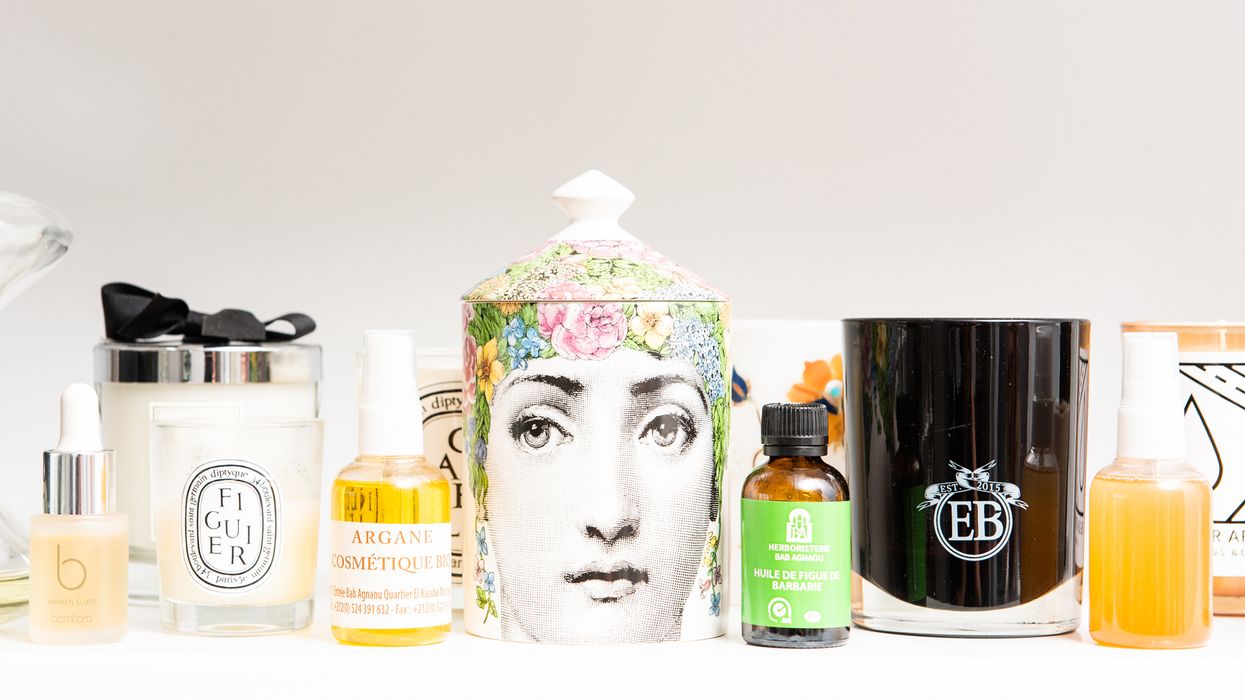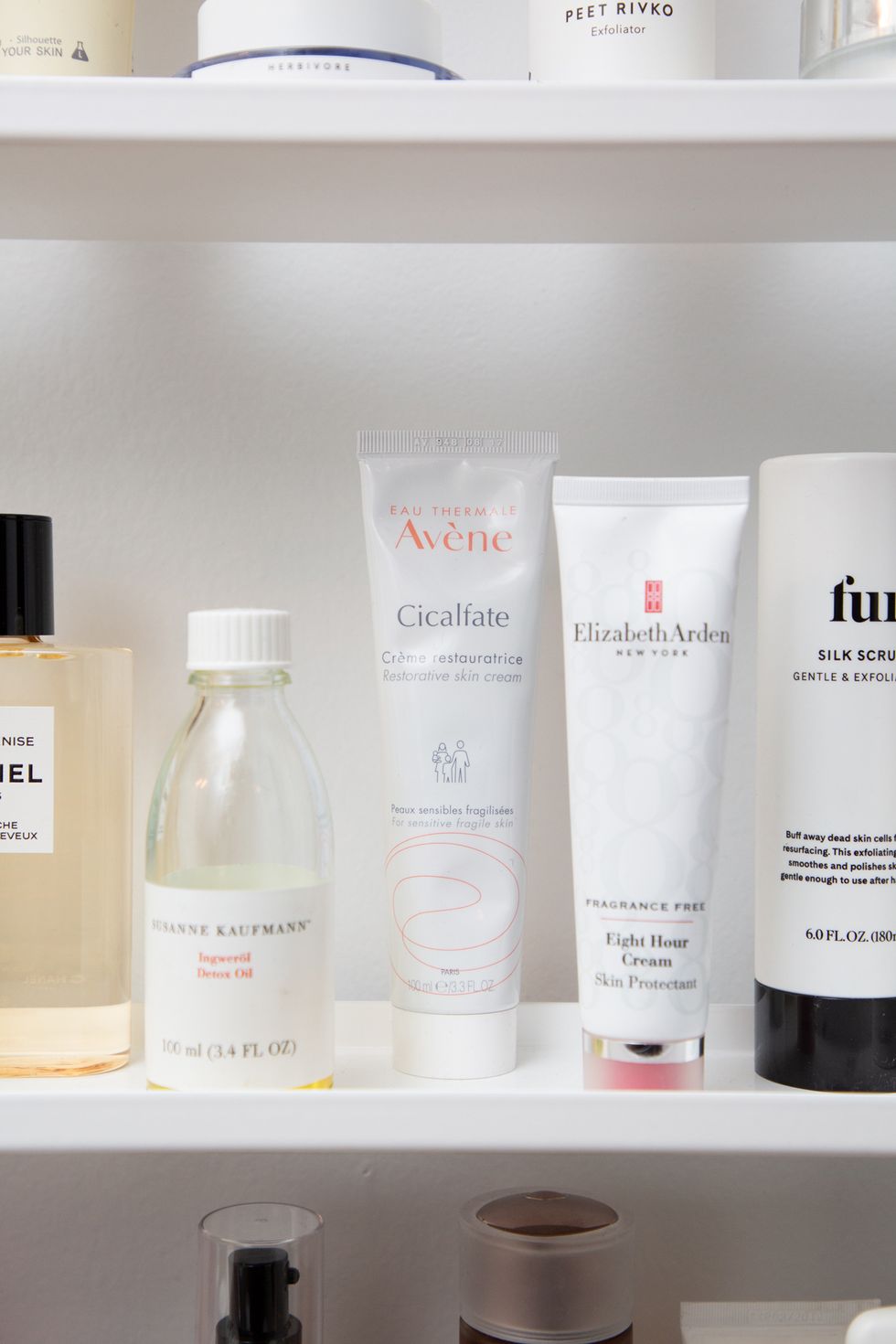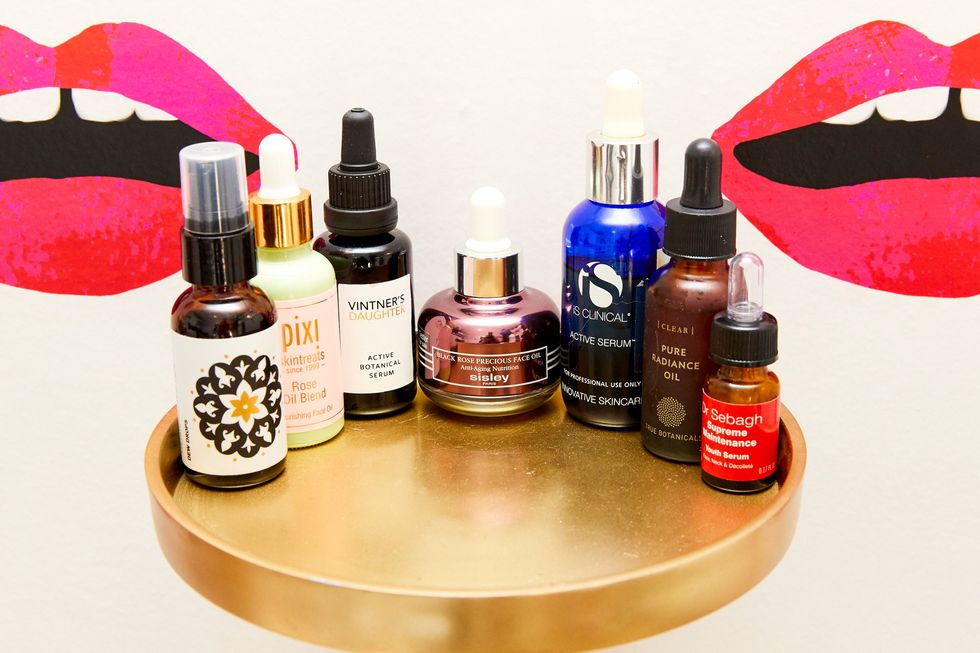An Expert Guide to Traditional and Natural Retinol
Are plant-derived alternatives worth the hype?
13 November, 2019
Skin
10 November, 2021
If you’re at all interested in skin-care products that minimize fine lines, fight acne breakouts, and tackle hyperpigmentation, then you’ve surely heard about the wonders of retinol. In short, it’s one of the most effective ingredients on the market for ensuring that your skin is even and glowy, and it’s available in over-the-counter formulations as well as dermatologist-prescribed topicals. But lately, brands have been touting natural, plant-derived, or vegan (meaning no animal-derived ingredients) retinol in their products, especially the oh-so-fun-to-pronounce bakuchiol (bah-koo-chee-all).
So what’s the deal with this new kid on the beauty block? Is it as effective as the various other retinoids we know and love? We decided to consult three experts to learn whether or not we need to overhaul our skin-care routines: Dr. Morgan Rabach, a board-certified dermatologist and co-founder of LM Medical; Dr. Joshua Zeicher, director of cosmetic and clinical research in dermatology at Mount Sinai Hospital in New York; and Michelle Wong, a Sydney-based science educator with a PhD in chemistry and a serious love for all things beauty. Here’s what they had to say.
So what’s the deal with this new kid on the beauty block? Is it as effective as the various other retinoids we know and love? We decided to consult three experts to learn whether or not we need to overhaul our skin-care routines: Dr. Morgan Rabach, a board-certified dermatologist and co-founder of LM Medical; Dr. Joshua Zeicher, director of cosmetic and clinical research in dermatology at Mount Sinai Hospital in New York; and Michelle Wong, a Sydney-based science educator with a PhD in chemistry and a serious love for all things beauty. Here’s what they had to say.

First, a quick primer on retinoids versus retinol:
Says Dr. Zeichner, “Retinoids are a class of molecules all related to vitamin A. There are many different forms including pure retinol, retinaldehyde, retinyl esters, and prescription versions like Tretinoin. Most retinoids are produced synthetically in the lab, and they are perhaps the best-studied ingredient we have available in skin care to fight aging skin and improve the appearance of fine lines and wrinkles. They work by binding retinoid receptors in the skin to tell cells to rev up collagen production.”
What is the difference between a traditional retinol and natural alternatives (like bakuchiol) in terms of their formula and source?
The biggest thing to understand is that retinol, as you’ve traditionally known it, is usually derived from animal sources like beef, chicken liver, eggs, and fish, but it can also be found in many plants and vegetables like cantaloupe, carrots, squash, sweet potatoes, and pumpkin. However, Dr. Rabach clarifies that “although found in nature, most retinols utilized for commercial purposes are synthetically derived in a laboratory setting, exactly mimicking the molecule found in nature. There are many different chemicals that are derivatives of the vitamin A molecule, and depending on the type of retinoid, it has a milder or stronger effect on the skin.”
Bakuchiol, the new natural retinol star, is derived from the seeds of the Psoralea corylifolia plant. According to Dr. Rabach, “The structure of the compound is in the class terpenophenol and is a large molecule. In other words, on a molecular level, bakuchiol does not resemble a traditional vitamin A derivative.” Although there is no structural resemblance to retinol, bakuchiol does manage to have retinol functionality via “retinol-like regulation of gene expression.” That means it still prompts cell turnover and stimulates the production of collagen.
Is one more potent and/or effective than the other?
There sadly haven’t been that many studies comparing bakuchiol to different retinoids, so a lot of that data is yet to be collected. Of the one Dr. Rabach cited (a 2018 randomized, double-blind, 12-week clinical study with 44 volunteers) it was demonstrated that “bakuchiol is comparable with retinol in its ability to improve photoaging, [like] wrinkles and hyperpigmentation, but has a better skin tolerance.”
Traditional retinoids, however, are available in numerous different strengths depending on what condition you’re treating and your skin’s sensitivity. Says Wong, “Adapalene has different receptor selectivity, so it's usually recommended for acne rather than aging.” This is also the weakest retinoid, so it’s ideal for sensitive skin. Tretinoin is a prescription-strength vitamin A derivative that is more potent than retinol, followed by Tazarotene, which is the strongest of the bunch.
Says Dr. Rabach, “Usually with retinoids, skin tolerance and strength go hand in hand. Meaning the stronger the retinoid, the more side effects in terms of irritation and dryness on the skin. So if I had to place a wager on bakuchiol, I would guess that it was on the weaker side of the retinol spectrum in terms of effectiveness.”
Says Dr. Zeichner, “Retinoids are a class of molecules all related to vitamin A. There are many different forms including pure retinol, retinaldehyde, retinyl esters, and prescription versions like Tretinoin. Most retinoids are produced synthetically in the lab, and they are perhaps the best-studied ingredient we have available in skin care to fight aging skin and improve the appearance of fine lines and wrinkles. They work by binding retinoid receptors in the skin to tell cells to rev up collagen production.”
What is the difference between a traditional retinol and natural alternatives (like bakuchiol) in terms of their formula and source?
The biggest thing to understand is that retinol, as you’ve traditionally known it, is usually derived from animal sources like beef, chicken liver, eggs, and fish, but it can also be found in many plants and vegetables like cantaloupe, carrots, squash, sweet potatoes, and pumpkin. However, Dr. Rabach clarifies that “although found in nature, most retinols utilized for commercial purposes are synthetically derived in a laboratory setting, exactly mimicking the molecule found in nature. There are many different chemicals that are derivatives of the vitamin A molecule, and depending on the type of retinoid, it has a milder or stronger effect on the skin.”
Bakuchiol, the new natural retinol star, is derived from the seeds of the Psoralea corylifolia plant. According to Dr. Rabach, “The structure of the compound is in the class terpenophenol and is a large molecule. In other words, on a molecular level, bakuchiol does not resemble a traditional vitamin A derivative.” Although there is no structural resemblance to retinol, bakuchiol does manage to have retinol functionality via “retinol-like regulation of gene expression.” That means it still prompts cell turnover and stimulates the production of collagen.
Is one more potent and/or effective than the other?
There sadly haven’t been that many studies comparing bakuchiol to different retinoids, so a lot of that data is yet to be collected. Of the one Dr. Rabach cited (a 2018 randomized, double-blind, 12-week clinical study with 44 volunteers) it was demonstrated that “bakuchiol is comparable with retinol in its ability to improve photoaging, [like] wrinkles and hyperpigmentation, but has a better skin tolerance.”
Traditional retinoids, however, are available in numerous different strengths depending on what condition you’re treating and your skin’s sensitivity. Says Wong, “Adapalene has different receptor selectivity, so it's usually recommended for acne rather than aging.” This is also the weakest retinoid, so it’s ideal for sensitive skin. Tretinoin is a prescription-strength vitamin A derivative that is more potent than retinol, followed by Tazarotene, which is the strongest of the bunch.
Says Dr. Rabach, “Usually with retinoids, skin tolerance and strength go hand in hand. Meaning the stronger the retinoid, the more side effects in terms of irritation and dryness on the skin. So if I had to place a wager on bakuchiol, I would guess that it was on the weaker side of the retinol spectrum in terms of effectiveness.”

Do they differ in their shelf life and how stable they are?
The old adage of only using your retinol at night to prevent the breakdown by UV rays doesn’t apply to bakuchiol. That means you can incorporate your serum or cream into your daytime routine (underneath your SPF, of course) because it is not inactivated by sunlight. However, as Wong explained, “Different retinol formulations can make a difference [in shelf life], too. For example, encapsulated retinol is more stable than non-encapsulated retinol.”
What is the argument for using a natural formula or a vegan formula over a traditional retinol?
Although Dr. Rabach agrees that any reduction in the use of animal products is good for the planet, she doesn’t see a solid argument for using a natural alternative when it comes to the health of your skin. Dr. Zeichner explains, “Clean beauty has become an extremely popular trend right now. These products are free of potentially harmful or irritating ingredients and are derived from sustainable sources. Vegan refers to the formulation process, not necessarily the retinol itself, so I would not expect a vegan product containing retinol to work to be any less effective than a traditional one.” And Wong believes that the choice to use a natural or vegan formula is more personal and usually relates to whether or not you eat vegan or live a certain type of lifestyle.
Do you think natural retinol is a trend that will pass in the coming months and years?
Says Dr. Rabach, “There is a lot of excitement over this ingredient, and rightly so, but I do not think it will replace retinoids. I think it will be used as another skin tool, depending on an individual’s skin needs.” Dr. Zeichner argues that if you have particularly sensitive skin, a natural alternative might allow you to obtain the skin-care benefits of retinol in a less irritating formula. Essentially, you can consider it another player on your skin-care roster.
Any final thoughts on natural and traditional retinol?
Like anything that is shiny and new in the world of beauty, there is the simple fact that it hasn’t been studied as much as other, older ingredients. Traditional retinoids have been the subject of various trials and testing for decades and have been determined to be safe and effective. With time, the same will happen with natural alternatives so long as consumers remain interested in using them.
As Dr. Rabach explains, “Different types of retinoids have varying strengths, [which allows] your dermatologist to prescribe just the right one for your skin type and what you are looking to achieve. For example, people with sensitive skin may want to try a retinoid like Adapalene, which is now over-the-counter and super gentle. Others with oily skin may need a stronger retinoid, like Tazarotene. We have so much information about strengths and formulations of retinol; with bakuchiol, we really don't know where it fits into the spectrum of retinol strengths and the long-term side effects or efficacy.”
Dr. Zeichner concurs. “No matter what form of retinol or retinoid alternative you are using, it takes several months of continuous use to observe noticeable differences in the skin.”
Want more stories like this?
The 8 Best Over-the-Counter Retinol Products
9 Product Ingredients That Make Beauty Editors Cringe
Once & for All: How Long Do Your Beauty Products Last?
The old adage of only using your retinol at night to prevent the breakdown by UV rays doesn’t apply to bakuchiol. That means you can incorporate your serum or cream into your daytime routine (underneath your SPF, of course) because it is not inactivated by sunlight. However, as Wong explained, “Different retinol formulations can make a difference [in shelf life], too. For example, encapsulated retinol is more stable than non-encapsulated retinol.”
What is the argument for using a natural formula or a vegan formula over a traditional retinol?
Although Dr. Rabach agrees that any reduction in the use of animal products is good for the planet, she doesn’t see a solid argument for using a natural alternative when it comes to the health of your skin. Dr. Zeichner explains, “Clean beauty has become an extremely popular trend right now. These products are free of potentially harmful or irritating ingredients and are derived from sustainable sources. Vegan refers to the formulation process, not necessarily the retinol itself, so I would not expect a vegan product containing retinol to work to be any less effective than a traditional one.” And Wong believes that the choice to use a natural or vegan formula is more personal and usually relates to whether or not you eat vegan or live a certain type of lifestyle.
Do you think natural retinol is a trend that will pass in the coming months and years?
Says Dr. Rabach, “There is a lot of excitement over this ingredient, and rightly so, but I do not think it will replace retinoids. I think it will be used as another skin tool, depending on an individual’s skin needs.” Dr. Zeichner argues that if you have particularly sensitive skin, a natural alternative might allow you to obtain the skin-care benefits of retinol in a less irritating formula. Essentially, you can consider it another player on your skin-care roster.
Any final thoughts on natural and traditional retinol?
Like anything that is shiny and new in the world of beauty, there is the simple fact that it hasn’t been studied as much as other, older ingredients. Traditional retinoids have been the subject of various trials and testing for decades and have been determined to be safe and effective. With time, the same will happen with natural alternatives so long as consumers remain interested in using them.
As Dr. Rabach explains, “Different types of retinoids have varying strengths, [which allows] your dermatologist to prescribe just the right one for your skin type and what you are looking to achieve. For example, people with sensitive skin may want to try a retinoid like Adapalene, which is now over-the-counter and super gentle. Others with oily skin may need a stronger retinoid, like Tazarotene. We have so much information about strengths and formulations of retinol; with bakuchiol, we really don't know where it fits into the spectrum of retinol strengths and the long-term side effects or efficacy.”
Dr. Zeichner concurs. “No matter what form of retinol or retinoid alternative you are using, it takes several months of continuous use to observe noticeable differences in the skin.”
Want more stories like this?
The 8 Best Over-the-Counter Retinol Products
9 Product Ingredients That Make Beauty Editors Cringe
Once & for All: How Long Do Your Beauty Products Last?